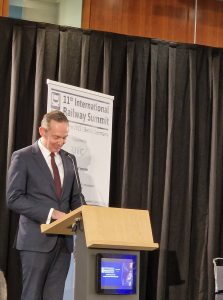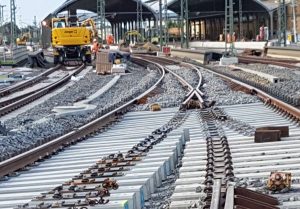 “Railway transport has a tremendous contribution for supply chain in crisis. This has been showed during the pandemic and the war in Ukraine, which allowed people to flee from the country and saved lives. On the other hand, we need railway to transport grains from Ukraine to the rest of Europe and last but not least, is the way to decarbonise the transport sector to achieve climate goals,” Germany’s Federal Minister for Digital and Transport Volker Wissing said at the 11thInternational Railway Summit being organised in association with the International Union of Railways (UIC). The event is held in Berlin on 30 May-1 June 2022.
“Railway transport has a tremendous contribution for supply chain in crisis. This has been showed during the pandemic and the war in Ukraine, which allowed people to flee from the country and saved lives. On the other hand, we need railway to transport grains from Ukraine to the rest of Europe and last but not least, is the way to decarbonise the transport sector to achieve climate goals,” Germany’s Federal Minister for Digital and Transport Volker Wissing said at the 11thInternational Railway Summit being organised in association with the International Union of Railways (UIC). The event is held in Berlin on 30 May-1 June 2022.
According to DB’s Strong Rail strategy, the company intends to double the long-distance patronage to over 260 million passengers adding one billion new regional and local passengers, this will result into the reduction of the number of car trips in Germany by 5 million and domestic flights by 14,000 every day. On rail freight traffic, the strategy states that DB Cargo’s traffic volumes in Germany will rise by 70% and rail freight market share will increase from 15% to 25% the equivalent of 13 million fewer truck trips per year in Germany. At the same time, the plans include infrastructure projects to provide the needed capacity along the network.
“We can achieve all these objectives only if we will provide investments for infrastructure modernisation, upgrades and expansion, including signalling renewal and digitalisation. This means projects will be implemented at national level,” the minister said.
Deutsche Bahn has announced that this year will invest EUR 13.6 billion, around EUR 900 million more than in the previous year. The plans included the modernisation and renewal of 1,800 km of tracks, 2,000 points, 140 bridges and 800 stations. This will create more capacity on the network and make the existing infrastructure more efficient.
 During the summit, Volker Wissing underlined that investment is not the biggest problem. “The challenge is the way we have to deal with construction sites. More is not always better. Maintaining and expanding means more construction sites that affect the passenger and freight transport which harms the punctuality. We cannot have too much construction sites because the traffic will be turned upside down. We need to tackle this problem and to bring a balance between building and traffic,” the minister explained.
During the summit, Volker Wissing underlined that investment is not the biggest problem. “The challenge is the way we have to deal with construction sites. More is not always better. Maintaining and expanding means more construction sites that affect the passenger and freight transport which harms the punctuality. We cannot have too much construction sites because the traffic will be turned upside down. We need to tackle this problem and to bring a balance between building and traffic,” the minister explained.
With DB, the Federal Ministry will seek for solutions to tackle this challenge and to better plan the construction activities in such a way that the impact is minimised.
Digitalisation and expansion also play a key role for quality and punctuality while providing efficient and high performance rail services on the network. This will be ensured by introducing the new technology such as ERTMS large scale deployment, the digital automatic coupling (DAC), which are innovative products and solutions that digitalise the rail system.
Share on:



